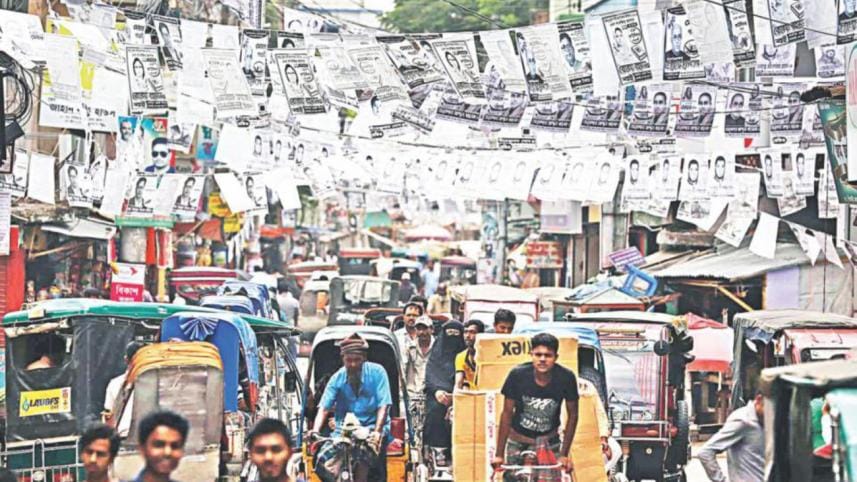All cards laid on the table, what now for Dhaka North?

One more day and it's election time for the northern part of the capital city. Residents of the Dhaka North City Corporation (DNCC) will choose their mayor for the second time in four years since the first mayoral election of a bifurcated Dhaka was held in 2015. To be specific, the February 28 by-poll will choose a successor to the first DNCC mayor Annisul Huq. Annisul Huq, the endearing businessman and media personality who set a high standard for the job of a mayor, died midway through his term on November 30, 2017, leaving the residents stuck and stewing in an endless cycle of sufferings. Since his death, DNCC has been without an anchor—a situation that the by-poll will try to address. The question is, how successfully can it do so? Will the residents finally get the mayor that they deserve? Will the election be held in a free and fair manner? Given the current state of affairs, perhaps an equally reasonable question is: how willing are the residents to vote really?
Unlike the 2015 election, the 2019 by-poll has come without much fanfare and activity. A preternatural hush hangs over the North, which contrasts the interest and enthusiasm shown by the public during the last mayoral election. The roads and signposts do not have their usual display of banners and leaflets. The tea stalls are silent. People, it seems, have more important things to do than concern themselves with arguments over who will become the mayor. Or, they just don't care, which increasingly seems to be the reason given the political apathy that takes root in a society in the absence of a meaningful democracy. Even the mayoral aspirants, except for the Awami League-nominated candidate, are conspicuous by their absence from public platforms, although the councillor candidates have proved to be more active.
There is no denying that democracy in Bangladesh has had a rough go of it lately, leading to great public unease about the utility of an electoral exercise and the force-feeding of a development narrative devoid of the spirit of democracy. But four specific reasons can be linked to their disinterest in the upcoming by-poll. The most obvious one, of course, is the boycott of the election by BNP and most left-leaning and Islamist parties. Whereas the 11th parliamentary election held on December 30 was attended by candidates from all 39 political parties registered with the Election Commission, only four parties have fielded their candidates for the mayor position in the DNCC by-poll, which comes only two months after the national election. (Of the five mayoral candidates, one is an independent.) The boycott by the opposition has had the inadvertent effect of disillusioning even the non-partisan voters.
The other three possible reasons are: a lack of public confidence in the Election Commission, distrust in the administration which will assist the EC in conducting the election, and the short terms of those who will be elected. Even the Chief Election Commissioner, himself at the centre of the EC's credibility crisis, has reportedly expressed frustration about the lack of political participation. Publicly, however, he remains as incorrigibly optimistic about this election as he was about the national election—or all other elections held during his term, for that matter. "The 11th general election was held in a fair manner," he claimed earlier this month. "We want the Dhaka city corporation elections to be held like the national election." Even now, after all that happened before and after the December 30 election, he betrays no sense of understanding, much less of endorsing, the rudiments of democracy and the importance of public trust. The CEC needs to ask himself why those who had been demanding an election in the DNCC a few months ago have pulled out of it now that it is finally here. What has changed?
For now, another important concern is if low public confidence will result in low turnout. The DNCC already has a reputation for low turnout. According to media reports, during the 2015 polls—which simultaneously saw elections in DNCC, DSCC (Dhaka South City Corporation) and CCC (Chattogram City Corporation)—the DNCC election was marked by the lowest turnout (37.30 percent), as only 8,74,581 of 23,44,900 voters cast their votes. Of them, 33,581 votes were also cancelled. So even if the EC can deliver a fair election, there is no telling if enough people will turn up to make it meaningful. Reports by various media organisations have further stoked concerns about the adequacy of EC's effort to attract voters, with little to no campaign to engage them or allay their concerns. Although a public holiday has been announced for February 28 so that people can go to the polling centres and cast their votes, there will be barriers to movement, like there were during the national election, which is hardly encouraging for a prospective voter.
That being said, we must welcome the DNCC by-poll in the spirit of democracy, and also because there is no alternative to a functioning city corporation helmed by a mayor to tackle the challenges created by Annisul Huq's absence and address the ever-mounting pressure to make Dhaka remotely liveable again. That's a tall order by any measure, and the next mayor, whichever party he belongs to, must know that there is no turning away from this. The DNCC, and indeed Dhaka in general, is going through a liveability crisis which is unprecedented. He must make a concerted effort to tackle this crisis.
Badiuzzaman Bay is a member of the editorial team at The Daily Star.
Email: badiuzzaman.bd@gmail.com




Comments